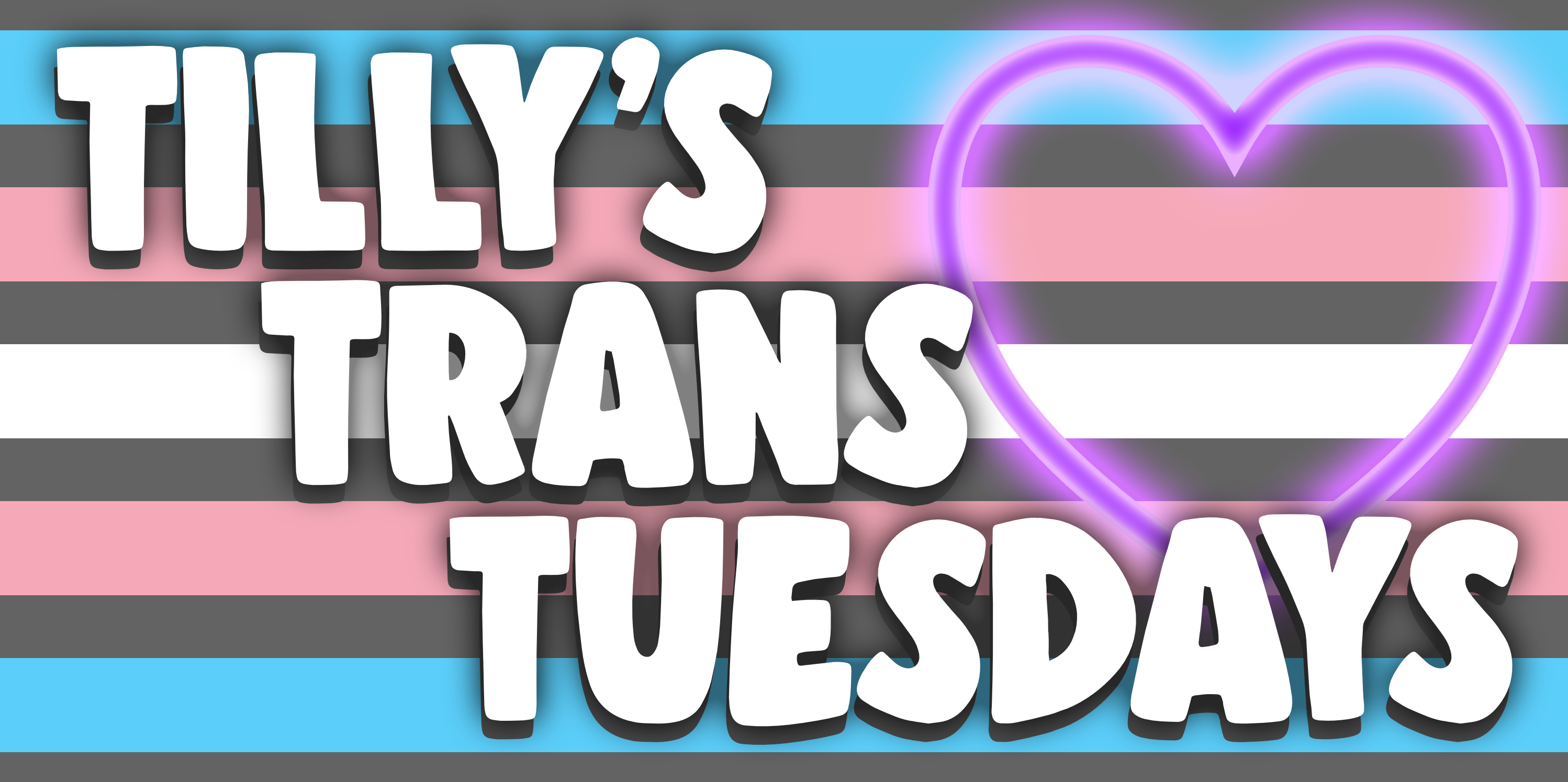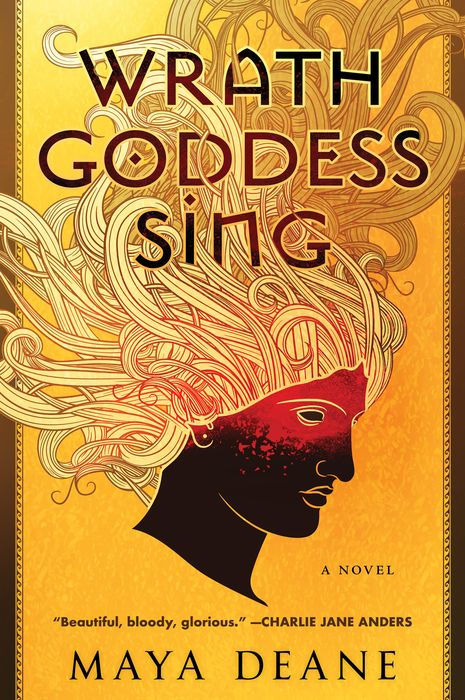Welcome to #TransTuesday! We’re back with the conclusion of my interview with @mayadeanewriter, author of WRATH GODDESS SING – a retelling of the ILIAD with Achilles as a trans woman. We’re getting into other trans characters, my favorite passages, and more!
If you missed PART 1, be sure you check that out first! And then dive right into part 2!
As a reminder, you can get a copy of the book from the publisher:
https://www.harpercollins.com/products/wrath-goddess-sing-maya-deane
Or on Amazon to help boost its rankings (leave a rating and review!):
https://www.amazon.com/Wrath-Goddess-Sing-Maya-Deane/dp/0063161184/
TB: In Wrath Goddess Sing Brisewos is a trans man, his analogue being a cis woman named Briseis in the original versions. It made his dynamic with Achilles and the Amazons fascinating. Why specifically did you choose to make him a trans man, and not one of the other characters?
MD: Nobody knows what to do with Briseis, and in many retellings, Briseis could easily be replaced by a solid gold rubber ducky and have just as much personality and agency and role in the story.
MD: Homer’s Briseis is the best out there, because at least she speaks bluntly of her positionality as a war captive, and while she is treated by the Achaians as a prize, the poem itself confronts her full humanity.
MD: When I realized that Briseis lived in a town founded by Amazons, I also realized that I had the opportunity to do something different with the character. I started with the question “How would the Amazons react to trans women? Well, how about trans men?” and went from there.
MD: Given that Briseis is a love interest (and slave) of Achilles in the Iliad, Brisewos is a chance to explore and subvert that: what do the events of the Iliad look like…
MD: …if Brisewos was with Achilles voluntarily for purposes of his own, then left her voluntarily for reasons of his own?
TB: There are many references to Achilles “in the well,” a horrible event she actually went through, but it’s also used as metaphor for her dysphoria. “At times like now, when she was entirely alone in the world, she was still at the bottom of the well, still surrounded by water, her lungs and limbs still burning as she fought to breathe.”
TB: I’ve often described my own gender dysphoria as being like drowning, which is not dissimilar. Did any of your own possible dysphoria play into the wording of that? What made that specific metaphor be the one you landed on?
(Here’s the very first Trans Tuesday I ever wrote, on GENDER DYSPHORIA.)
MD: Yes, my own experiences with dysphoria certainly were relevant. I was also thinking a lot about the trans reading of the biblical Yosef/Joseph/Yusuf, who was thrown into a well by her brothers, and about the numerous drowned trans women in myth…
MD: …and literature and archeology (some believe the Iron Age bog bodies of northern Europe were predominantly feminine men and trans women) and the imagery was enormously powerful.
TB: Many passages spoke very deeply to me. I’d like to call some of them out specifically, with a question to follow.
TB: I’ve never seen the loss of hormone replacement therapy described so aptly, so surface-level, so “HEY THIS IS EXACTLY WHAT IT’S LIKE WHEN YOU TAKE HRT AWAY FROM TRANS PEOPLE”:
TB: “On the journey to Agamemnon’s army, she would have none of the herbs that had spared her the indignities of manhood, and the process would resume.”
TB: “Hair would sprout on her chest and shoulders and back as it had on Odysseus; a beard would follow; she would lose the fiery curls on her head; she would stink like a bull; her skin would roughen and bulge with veins; it would be worse than death.”
TB: “And it would be death—the death of her self, the inexorable corrosion of her soul, until even her name was forgotten and nothing was left but the shell of a man she never was.”
(See the Trans Tuesday on HORMONE REPLACEMENT THERAPY)
TB: There’s even a bit where you talk about tucking: “The underclothes she wore were tighter than usual, form-fitting around her waist and under her groin, holding everything crushed flat to preserve her dignity.”
(See the Trans Tuesday on TUCKING AND BINDING)
TB: There’s also bits where you talk about the stares we often receive from cis people in public: “She could feel the eyes of the Myrmidons on her back, the chagrin of some, the curiosity of others—Not often that a scrawny weakling comes back a princess…”
TB: “…she thought grimly, so I can’t blame them for staring—but they would not meet her eyes, no matter how fiercely she stared them down.”
TB: “Some gave Achilles doubtful looks as they passed; some looked at her curiously; but nobody seemed able to walk by her without staring at all.”
(See the Trans Tuesday on STOP STARING AT US (trans people are human beings).)
TB: And the bits of truth in how cis people will defend the other cis people who’ve made our lives hell, not able to comprehend the evils they’ve visited upon us:
TB: “She did not want to think about his crushed body, or his past, or his love for her father, or his intentions in throwing her down a well. At least now she would be free of the well forever, and the memory would fade.”
TB: “‘I’m taking the wineskin,’ she said at last. ‘That’s fine,’ said the old man. ‘I just wanted you to know he wasn’t all bad.’ ‘To me he was,’ said Achilles, ‘but I understand your feelings.’ It was a lie, but it should shut him up.”
(See the Trans Tuesday on TRANS POLITICS, and how cis people need to stop tolerating transphobia in their friends and family if things are ever going to get better)
TB: Or the ways that even as our dysphoria lessens or, if we’re lucky, dissipates, we can never ever escape the memories of it haunting us for our entire lives.
TB: “Yes, Helen purred, let your memory take you back to the place you never left. For me, it is sunrise on a mountaintop—when and where, I do not know, but the sun rises and the sea covers everything and I am utterly alone. For you, it is at the bottom of a well.”
(See the Trans Tuesday on THE PAST (and why it haunts us), and how difficult it can be for those of us who transition as adults to have every memory tainted by dysphoria)
TB: Or the way our deadnames can be such a source of pain for us: “…a childhood of cruel brothers with sharp elbows who called her a boy, and a hated inescapable name. Joseph, Joseph, Joseph—it stuck to Kiya like a curse.”
TB: “In the cages in Egypt they had called her Joseph; as the knife cut her, Joseph; as she tumbled into the darkness of the well, screaming and flailing at the air, she heard them jeering Joseph.”
TB: “But she had torn that name away and risen from the darkness to challenge the gods themselves.”
TB: Or the pain of going through the wrong puberty: “No, she would show her what it was like to be broken and twisted, to lose your body, to watch yourself warp and twist and become hideous.”
(See the Trans Tuesday on TRANS KIDS AND THE INTAKE EXAM to understand what forcing trans kids through the wrong puberty can do to them)
TB: It meant so much to me to see our experiences described so eloquently on the page. Was the choice from the beginning always to make the book so very clearly about our specific experiences as trans women, or did something along the way prompt it to get more explicitly trans?
TB: I guess what I’m getting at is did you intend to be more subtle initially and then realized it in fact needed to be shouted from the rooftops, or was the plan always to make the book as blatantly “the trans woman experience” as possible?
MD: I literally always intended this to be blatantly about our lives as trans women. My life was changed when I first read an unpublished book by Alina Boyden back in 2017 that confronted trans women’s experiences head on; I felt things…
MD: …I had never felt in a lifetime of reading, and I realized for the first time how powerful literature could be. I thought I’d known years before — I’ve been a reader all my life — but no.
TB: There’s so little literature (or media of any kind out there) this specific to our experiences, and the way you felt reading Alina Boyden’s unpublished book is the way I felt with Wrath Goddess Sing.
TB: We have so little representation in media, and often it has to be only implied or hinted at. And even when we’re right there on the surface, it’s almost never about us. Where do you go from Wrath Goddess Sing?
TB: Have you said all you have to say about the trans experience? Are there other aspects you’d like to explore in other books, or is Wrath Goddess Sing the full statement on its own?
MD: I have a lot more to say. Achilles was a defiant, moody, furious teenager born into privilege and doom.
MD: I love her, but she is just one of the trans ghosts I need to summon up from the Great Below. Currently I am calling forth Kiya in a book I’m calling Beautiful on the Horizon.
TB: I’m very excited to get more of Kiya. Will this be the same version of her we see in Wrath Goddess Sing, or something else?
MD: She won’t be <spoilers> dead yet at the beginning of her story, but yeah, we will see her fall and rise and becoming, and eventually we will understand the scope of her 3400-year grand scheme.
Thanks again to @mayadeanewriter! She was super insightful and forthright, and as a big fan of the book it was an extra joy for me. From one trans lady writer to another, I can’t thank her enough for WRATH GODDESS SING. I’ll treasure it forever.
Tilly Bridges, end transmission.
tillysbridges@gmail.com

